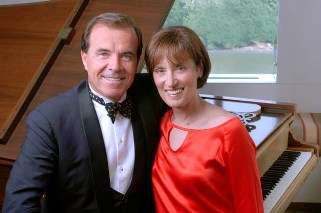|
Back
Schubert for the Sedated New York
Zankel Hall, Carnegie Hall
02/21/2018 -
Franz Schubert: Fantasie in F Minor for Piano Four Hands, D. 940 – Piano Sonata in A Major, D. 959
Alexander Scriabin: Etudes in B-flat Minor, Opus 8, No. 11 & in F-Sharp Major, Opus 42, No. 4
Aaron Copland: El salón México (arranged for two pianos by Leonard Bernstein)
Misha and Cipa Dichter (Pianists)

M. & C. Dichter (© Stefan Cohen)
In his last two physically agonizing years of life, Franz Schubert was urged on by that inner spirit to create music which was urgent and inevitable, encompassing glorious songs and manic cries. But above all, in his last three sonatas and the haunting Four-hand Fantasy, Schubert was compelled to climb his personal and emotional Matterhorn.
And had he been performed into today’s recital halls, he would have urged his artists to do the same.
That, I fear, was the problem with the recital by Misha Dichter last night. After almost six decades of performing with the greatest conductors, recording and winning prizes, his name was still unknown to me, and after reading his impressive résumé in the program last night, I felt guilt at my ignorance.
Mr. Dichter may still be a most impressive pianist, but those Schubert late works which started and finished the program were anything but effective. With his wife and long-time partner Cipa Dichter, the pianist started that haunting first theme of the F Minor Fantasy slowly, deliberately, as if the two were playing the work in their living room for the first time.
That sort of tempo is not unknown, even with the composer’s direction of a modified Allegro. In that case, though, one needs a dreaminess, a vision of music coming from an unconscious imagery. In the case of the Dichters, the music was simply lackadaisical. Granted, four-hand piano, which Schubert loved playing and writing, is hardly simple to accomplish. In this case, though Misha’s lower registers served as anything but a solid grounding for Cipa’s singing top registers. In fact, the music became something of a drone. One had the feeling that it was played literally to show students the harmonic structure before, adding at a future time, feeling.
Ditto for the somewhat turbulent second movement, the scherzo and a finale which did not do credit to Schubert’s inspiration. One wanted to be moved by the even old-fashioned fugues and canons, yet the Dichters, like transporting a broken-down car, only pushed the work physically to its destination. Admittedly, I am always moved by that heavenly cadence leading to the reprise of the first themes. Here, though, the remembrance of things past was solely that destination. They abandoned their vehicle, came out for applause, and started the next work.
The recital also finished with Schubert, the second of that “heavenly trio” of sonatas written while he was dying. Unlike the last music of Mahler and Bruckner, one wouldn’t know Schubert’s agonies. He had too much else to say.
Not that Misha Dichter said much of it in this performance. To say that is was understated would be an understatement. It was played literally, correctly, with the technique one might expect after his decades on the concert stage. Yet this first movement was bloodless. One doesn’t need accentuation on the modulations on the opening. Yet even a cold performance needs sensitivity, and this didn’t have it.
The cryptic recitations in the second movement are so challenging, so eccentric, that any good pianist should take the dare. As with rest of his music. Mr. Dichter never took the challenge, the often demented “shouting out” was simply an interesting interlude. Perhaps an artist doesn’t have to pay much undue attention here, but Mr. Dichter, one fears, went through the motions...or emotions.
The last two movements were...well, comfortable. Not what we want. Whether Mr. Dichter brought his own claque or not, the whistles, cheers and huzzas from the audience were hardly appropriate for an underimpressive performance.
The Schubert apart, this was not a terrible recital. Mr. Dichter is reputed for his performance of Bernstein and other American composers. Both he and Cipa are products of Americana-diversity as well. Misha was born in Poland, fleeing to Shanghai (not the Jewish-Shanghai glory-days as vividly depicted by historian Stella Dong, but the anarchic Shanghai of refugees during the Second World War), them to America. Cipa was born in Brazil, the wunderkind child of Polish-Russian parents. Thus their splendid performance El salón México–an evocation of Mexico two other Jews in America–was only natural.
Bernstein’s arrangement of Aaron Copland’s zesty tone-picture was utterly delicious. Without the mariachi trumpets, Bernstein still caught the rhythms, the colors and the accents. This time at two pianos, the Dichters played with all the joy necessary.
Mr. Dichter’s performance of two Scriabin Etudes was both exalting and dismaying. The works were dreamy, twisted, eccentric, seemingly drug-induced. Mr. Dichter, by playing with no particular showiness, made the notes come alive. It was dismaying because the music was so jarring, almost disconcerting, next to the Copland and Schubert. One wanted more One was just beginning to get in the trance, when the mood jarringly changed to the unimposing Schubert.
In fact, after the Schubert Sonata, Mr. Dichter played a wild and actually rousing Liszt Hungarian Rhapsody. It was hardly meticulous, was a bit sloppy, but rhythmically he drove forward for a performance which justified his past history. In other words, it had blood, guts, and even what the Schubert lacked, unabashed, unashamed personality.
Harry Rolnick
|